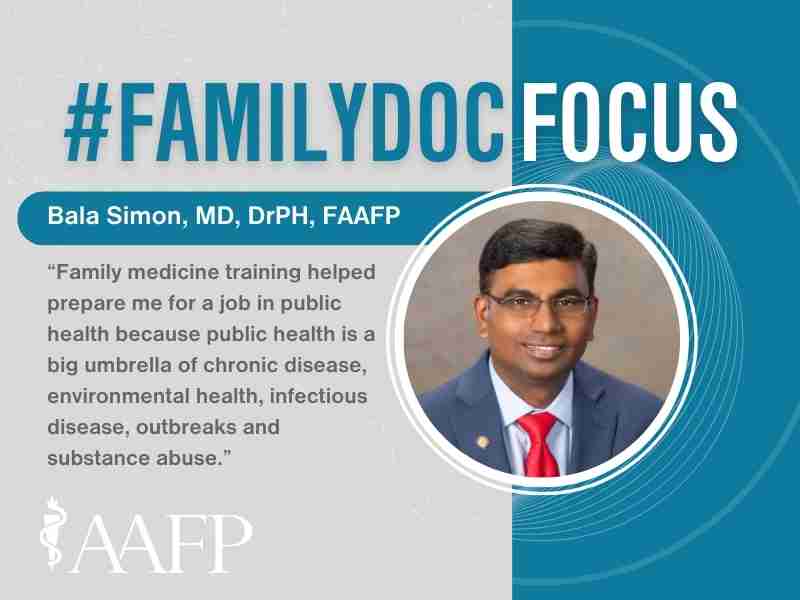FP Highlights Family Medicine’s Vital Role in Public Health
Oct. 11, 2023, David Mitchell — Bala Simon, M.D., Dr.P.H., FAAFP, was pondering whether to pursue residency training in internal medicine or pediatrics while working on his doctorate in public health when a noted researcher and public health official pointed him in a different direction.

“My mentor said, ‘You’ll have the best of both worlds and find your place in family medicine,” said Simon, an adjunct clinical associate professor in the Department of Family and Preventive Medicine at the University of Arkansas for Medical Sciences College of Medicine and Public Health. “I jumped in. I really enjoy family medicine because of the full spectrum of care. It’s not limited to one age group or gender. You become a jack of all trades.”
The mentor in question was Joseph Bates, M.D., M.S., the pulmonologist and epidemiologist who pioneered the outpatient treatment for tuberculosis before serving a long tenure as deputy health and chief science officer in the Arkansas Department of Health.
Simon didn’t follow his mentor into internal medicine, but he did follow his footsteps in public health. Simon, the state’s deputy chief medical officer and chronic disease director, hopes more family physicians will join him in that field.
“Family medicine training helped prepare me for a job in public health because public health is a big umbrella of chronic disease, environmental health, infectious disease, outbreaks and substance abuse,” said Simon, president of the National Association of Chronic Disease Directors.
Simon provides clinical oversight statewide for public health programs, including chronic disease prevention and control, tobacco prevention and cessation, substance misuse and injury prevention.
During the Family Medicine Experience, Oct. 26-29 in Chicago, Simon will present a CME session that urges family physicians to become champions of public health.
“My objective is for practicing physicians to know what public health is and how state and county health departments work,” he said. “There are opportunities to partner with public health and to help your entire community — not just our own patients.”
For example, each of the 75 counties in Arkansas has a volunteer health officer who acts as a spokesperson for public health efforts in their county.
“Most of them are family physicians,” Simon said. “Reach out to the public health office in your county or city and see what opportunities exist.”
But family physicians don’t necessarily have to take that big of a leap to make a difference in public health.
Simon said health departments nationwide act as safety nets that can help patients who need it and again pointed to his state for an example. Arkansas has a program that provides breast and cervical cancer screening for uninsured and underinsured women.
“What I hope is that family physicians would avail themselves of the resources of their local health departments and partner with them to serve the wider community,” he said. “Family physicians can assess the social determinants of health of patients who don’t have resources for screening and treatment and refer them to these types of programs.”
Simon, who is board certified in family medicine, lifestyle medicine, obesity medicine and preventive medicine, serves as an adjunct associate professor in the Department of Epidemiology at the Fay W. Boozman College of Public Health at UAMS. He continues to practice one day a week at the UAMS Little Rock Family Medicine Residency clinic, where he precepts residents. He also works as a hospitalist a couple of times a month to fulfill his passion for in-patient care.
Wherever they practice, Simon noted that family physicians can help disseminate free health education materials available in public health offices that can help inform patients about a wide range of health topics and conditions.